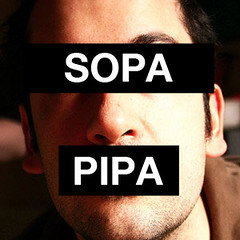 I joined both the Electronic Frontier Foundation and the American Civil Liberties Union today. I also give regularly to the Open Rights Group in the UK. I urge you to do the same.
I joined both the Electronic Frontier Foundation and the American Civil Liberties Union today. I also give regularly to the Open Rights Group in the UK. I urge you to do the same.
SOPA and PIPA – the Stop Online Piracy Act and the Protect IP Act respectively (PDF links) – are legislative acts that undermine the structure, culture and universality of the Internet. As Stanford Law Review points out, they’re unconstitutional and fundamentally in opposition to the principle of free speech:
This not only violates basic principles of due process by depriving persons of property without a fair hearing and a reasonable opportunity to be heard, it also constitutes an unconstitutional abridgement of the freedom of speech protected by the First Amendment. The Supreme Court has made it abundantly clear that governmental action suppressing speech, if taken prior to an adversary proceeding and subsequent judicial determination that the speech in question is unlawful,is a presumptively unconstitutional “prior restraint.” In other words, it is the “most serious and the least tolerable infringement on First Amendment rights,” permissible only in the narrowest range of circumstances. The Constitution requires a court “to make a final determination” that the material in question is unlawful “after an adversary hearing before the material is completely removed from circulation.”
I highly recommend reading the whole article, which also includes references, surrounding discussions and lots more detail.
This is a fight between old and new media, gatekeepers and consumers, democrats and those who seek to control discourse. One thing it’s not is a fight between people who want to pirate and people who are against it; a lot of people who oppose the bill, myself included, are also against piracy. The people – and they do exist – who choose to download illegally rather than purchase media when they have the choice are part of the problem, and not on the right side of the debate. However, there are better ways to fight piracy, and undermining the processes by which the Internet works is not an appropriate response – unless, of course, it’s the true purpose of the bill. I’ll leave you to make your own mind up, but it’s worth thinking about CBS Viacom’s role in distributing the software used to distribute files, and their own instructions for downloading copyrighted material.
The Internet is my livelihood. Rather than seek to undermine the rights of artists and creators, I’ve built platforms that – in a minor way – allow more people to create, share and be inspired. latakoo, for example, allows filmmakers and journalists to share their footage with editors, legal teams, customers and newsrooms more easily. Elgg allows people to learn, reflect and share with each other within schools, companies and organizations. Neither of these things undermines anyone’s rights. It sucks that a group of companies and lawmakers want to destroy the underlying principles through which I make my money – and which generate many billions of dollars every year – because some people prefer to steal their stuff than to buy it. When any website can disappear overnight without due process, the Internet becomes a very poor investment, and businesses are on shaky ground.
The MPAA has effectively suggested that we impose filters on the Internet similar to those in China and Iran. Yet, we also know that Netflix is reducing movie piracy in the US (implying that media companies need to better serve their potential customers), and more fundamentally that people who seek to pirate will find a way, whether through encryption, darknets or other methods. We also know that this is a great excuse to set up databases, track websites and create provisions to bring speech offline without due process. Let’s not let that happen.
One indication of the shadiness of these bills is that Lamar Smith, the author of SOPA, actually had a copyrighted image as the background of his website. In response to the discovery, his web team set up a block to prevent the Internet Archive from storing prior versions of his site – thereby hiding the evidence.
Once again, I encourage you to join organizations like ACLU, EFF and ORG, and to speak to your representatives. It’s not too late to save an industry, my job and our freedom of speech.
Leave a Reply